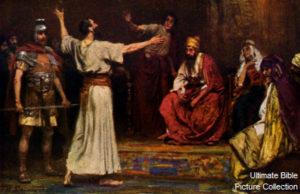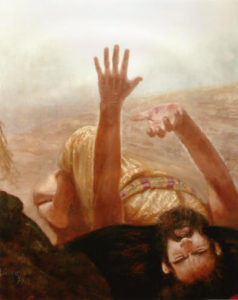 Isn’t that the essence of what Paul is professing to the Jews? That the resurrection of Jesus Christ was foretold in the Old Testament and simply a continuation of their religion, not necessarily a whole new religion?
Isn’t that the essence of what Paul is professing to the Jews? That the resurrection of Jesus Christ was foretold in the Old Testament and simply a continuation of their religion, not necessarily a whole new religion?
The new Governor Festus arrives in Caesarea, visits the Jews in Jerusalem, and invites them to come down to come down to Caesarea to make charges against Paul. They do so but the religious charges are groundless and are not applicable to Roman Law. Paul inadvertently appeals to Caesar while declaring his innocence. Governor Festus cutely agrees stating that “Thou hast appealed to Caesar; to Caesar thou shalt go.” Here is the story in the words of the Bible:
Governor Festus accordingly entered his providence, and three days afterwards he went up from Caesarea to Jerusalem.
Governor Festus to the chief priests and Jewish leaders: “let, therefore, your influential men go down with me and if there is anything wrong with this man, let them present charges against him.”
 Paul: “Neither against the Law of the Jews not against the temple nor against Caesar have I committed any offense.”
Paul: “Neither against the Law of the Jews not against the temple nor against Caesar have I committed any offense.”
Governor Fetus to Paul: “Art thou willing to go up to Jerusalem and be tried there before me on these charges?”
Paul: “I am standing at the tribunal of Caesar; there I ought to be tried. To Jews I have done n wrong, as thou thyself very well knowest. For if I have done any wrong or committed a crime deserving of death, I do not refuse to die. But if there is no ground to their charges against me, no one can give me up to them; I appeal to Caesar.”
Governor Festus: “Thou hast appealed to Caesar; to Caesar thou shalt go.”
Interestingly King Agrippa and Bernice (presumably his wife?) come to Caesarea to pay their respects to Festus. King Agrippa wants to hear Paul’s testimony and Governor Festus is all for it because he needs some details for the appeal when he sends Paul to Rome to be tried before Caesar:
King Agrippa and Bernice came to Caesarea to pay their respects to Festus…
Governor Festus: But when his accusers got up, they did not charge him with any of the crimes that I had expected. But they had against him certain questions about their own religion and about a certain Jesus, who had died, but who Paul affirmed was alive.
 King Agrippa: “I myself also could have wished to hear this man.”
King Agrippa: “I myself also could have wished to hear this man.”
Governor Festus: “thou shalt hear him.”
Governor Festus: ”Still I have nothing definite to write to my Lord (Caesar) about him (Paul)… after an examination (by King Agrippa) has been made I may have something to put in writing. For it seems to me unreasonable to send a prisoner without stating the charges against him.”
Paul tells his story to King Agrippa including his persecution of the Christians and the moment of his conversion, including these words of conversion directly from Jesus: “from the dominion of Satan to God; that they may receive forgiveness of sins and an inheritance among those sanctified by faith in me.’”
 Afterwards Governor Festus questions if Paul is ‘mad,’ and Paul’s response is that he is “not mad but I speak words of sober truth.” The truth can only be spoken in the abstinence of our denial, justification, and rationalization of the events of our lives.
Afterwards Governor Festus questions if Paul is ‘mad,’ and Paul’s response is that he is “not mad but I speak words of sober truth.” The truth can only be spoken in the abstinence of our denial, justification, and rationalization of the events of our lives.
Paul, saying nothing beyond what the Prophets and Moses said would come to pass, nearly converts King Agrippa on the spot!
The twist at the end is that Paul would not have to go to Rome had he not made an earlier appeal to Caesar. All agree that Paul has done nothing to deserve death or imprisonment.
More of the story in the words of the Bible:
 Paul (His persecution of Christians): …according to the strictest sect of our religion I lived a Pharisee… And I then thought it my duty to do many things contrary to the name of Jesus of Nazareth… many of the saints I shut up in prison… and when they were put to death I cast my vote against them… Often times in synagogues I punished them and tried to force them to blaspheme; and in my extreme rage against them I even pursued them to foreign cities.
Paul (His persecution of Christians): …according to the strictest sect of our religion I lived a Pharisee… And I then thought it my duty to do many things contrary to the name of Jesus of Nazareth… many of the saints I shut up in prison… and when they were put to death I cast my vote against them… Often times in synagogues I punished them and tried to force them to blaspheme; and in my extreme rage against them I even pursued them to foreign cities.
Paul (His conversion): “But while I was journeying on this business (of persecuting Christians) to Damascus… at midday O King, I saw on the way a light from heaven brighter than the sunshine round about me and my companions… I heard a voice saying to me in Hebrew, ‘Saul, Saul, why dost thou persecute me? It is hard for thee to kick against the goad (something that encourages, urges, or drives; a stimulus).’ I said ‘Who art thou, Lord?’ And the Lord said, ‘I am Jesus, whom thou are persecuting…  I have appeared before thee for this purpose, to appoint thee to be a minister and a witness to what thou hast seen, and to the visions that thou shalt have of me; delivering thee from the people and from the nations, to whom I am now sending thee, to open their eyes that they may turn from darkness to light and from the dominion of Satan to God; that they may receive forgiveness of sins and an inheritance among those sanctified by faith in me.’”
I have appeared before thee for this purpose, to appoint thee to be a minister and a witness to what thou hast seen, and to the visions that thou shalt have of me; delivering thee from the people and from the nations, to whom I am now sending thee, to open their eyes that they may turn from darkness to light and from the dominion of Satan to God; that they may receive forgiveness of sins and an inheritance among those sanctified by faith in me.’”
Paul to King Agrippa: “Therefore, I was not disobedient to the heavenly vision; but first to the people of Damascus and Jerusalem, and then all over Judea and to the Gentiles, I set about declaring that they should repent and turn to God, doing works befitting their repentance… But aided to this day by the help of God, I stand here to testify to both high and low, saying nothing beyond what the Prophets and Moses said would come to pass: that the Christ was to suffer, that he first by his resurrection from the dead was to proclaim light to the people and to the Gentiles.”
Festus: “Paul, thou art mad; thy great learning is driving thee to madness.”
Paul: “I am not mad but I speak words of sober truth.”
 Paul to King Agrippa: “Dost thou believe in the prophets? I know thou dost.”
Paul to King Agrippa: “Dost thou believe in the prophets? I know thou dost.”
King Agrippa to Paul: “In a short while thou wouldst persuade me to become a Christian.”
Paul to King Agrippa: “I would to God that, whether it be long or short, not only thou but also all who hear me today might become such as I am, except for these chains.”
Governor Festus and King Agrippa and Bernice and those who sat with them: “This man has done nothing to deserve death or imprisonment.”
King Agrippa to Governor Festus: “This man might have been set at liberty, if he had not appealed to Caesar.”

Day 132: Reading The Bible with a TROML Perspective; Nothing Beyond What the Prophets and Moses Said Would Come to Pass…
Read and inspired by the New Testament, The Acts of The Apostles Chapters 25-26.
Bible Notes:
Saint Luke, the author of the third Gospel, wrote also this history of the primitive Church. Opening with the story of the Ascension and Pentecost, this book records the important events of the early Church: the mass conversions after Pentecost; the persecution by Herod; the conversion of Saint Paul; his three missionary journeys; his arrest and final trip to Rome
Acts Chapter 25: Another plot to kill Paul fails; Paul before Festus; Paul appeals to Caesar; Agrippa hears of Paul’s case; Paul before Agrippa.
Governor Festus accordingly entered his providence, and three days afterwards he went up from Caesarea to Jerusalem.
Governor Festus to the chief priests and Jewish leaders: “let, therefore, your influential men go down with me and if there is anything wrong with this man, let them present charges against him.”
Paul: “Neither against the Law of the Jews not against the temple nor against Caesar have I committed any offense.”
Governor Fetus to Paul: “Art thou willing to go up to Jerusalem and be tried there before me on these charges?”
Paul: “I am standing at the tribunal of Caesar; there I ought to be tried. To Jews I have done n wrong, as thou thyself very well knowest. For if I have done any wrong or committed a crime deserving of death, I do not refuse to die. But if there is no ground to their charges against me, no one can give me up to them; I appeal to Caesar.”
Governor Festus: “Thou hast appealed to Caesar; to Caesar thou shalt go.”
King Agrippa and Bernice came to Caesarea to pay their respects to Festus…
Governor Festus: But when his accusers got up, they did not charge him with any of the crimes that I had expected. But they had against him certain questions about their own religion and about a certain Jesus, who had died, but who Paul affirmed was alive.
King Agrippa: “I myself also could have wished to hear this man.”
Governor Festus: “thou shalt hear him.”
Governor Festus: ”Still I have nothing definite to write to my Lord (Caesar) about him (Paul)… after an examination (by King Agrippa) has been made I may have something to put in writing. For it seems to me unreasonable to send a prisoner without stating the charges against him.”
Acts Chapter 26: Agrippa asks Paul to speak; Paul is glad to appear before Agrippa; Paul’s early life; His persecution of Christians; His conversion; His preaching and his arrest; The result of Paul’s defense.
Paul (His persecution of Christians): …according to the strictest sect of our religion I lived a Pharisee… And I then thought it my duty to do many things contrary to the name of Jesus of Nazareth… many of the saints I shut up in prison… and when they were put to death I cast my vote against them… Often times in synagogues I punished them and tried to force them to blaspheme; and in my extreme rage against them I even pursued them to foreign cities.
Paul (His conversion): “But while I was journeying on this business (of persecuting Christians) to Damascus… at midday O King, I saw on the way a light from heaven brighter than the sunshine round about me and my companions… I heard a voice saying to me in Hebrew, ‘Saul, Saul, why dost thou persecute me? It is hard for thee to kick against the goad (something that encourages, urges, or drives; a stimulus).’ I said ‘Who art thou, Lord?’ And the Lord said, ‘I am Jesus, whom thou are persecuting… I have appeared before thee for this purpose, to appoint thee to be a minister and a witness to what thou hast seen, and to the visions that thou shalt have of me; delivering thee from the people and from the nations, to whom I am now sending thee, to open their eyes that they may turn from darkness to light and from the dominion of Satan to God; that they may receive forgiveness of sins and an inheritance among those sanctified by faith in me.’”
Paul to King Agrippa: “Therefore, I was not disobedient to the heavenly vision; but first to the people of Damascus and Jerusalem, and then all over Judea and to the Gentiles, I set about declaring that they should repent and turn to God, doing works befitting their repentance… But aided to this day by the help of God, I stand here to testify to both high and low, saying nothing beyond what the Prophets and Moses said would come to pass: that the Christ was to suffer, that he first by his resurrection from the dead was to proclaim light to the people and to the Gentiles.”
Festus: “Paul, thou art mad; thy great learning is driving thee to madness.”
Paul: “I am not mad but I speak words of sober truth.”
Paul to King Agrippa: “Dost thou believe in the prophets? I know thou dost.”
King Agrippa to Paul: “In a short while thou wouldst persuade me to become a Christian.”
Paul to King Agrippa: “I would to God that, whether it be long or short, not only thou but also all who hear me today might become such as I am, except for these chains.”
Governor Festus and King Agrippa and Bernice and those who sat with them: “This man has done nothing to deserve death or imprisonment.”
King Agrippa to Governor Festus: “This man might have been set at liberty, if he had not appealed to Caesar.”

Speak Your Mind